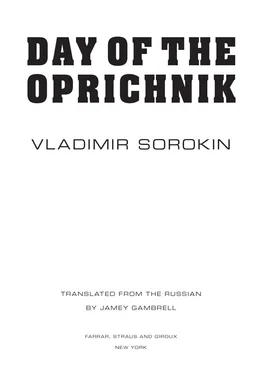Sorokin, Vladimir - Day of the Oprichnik
Здесь есть возможность читать онлайн «Sorokin, Vladimir - Day of the Oprichnik» весь текст электронной книги совершенно бесплатно (целиком полную версию без сокращений). В некоторых случаях можно слушать аудио, скачать через торрент в формате fb2 и присутствует краткое содержание. Год выпуска: 2011, Издательство: Farrar, Straus and Giroux, Жанр: Старинная литература, на английском языке. Описание произведения, (предисловие) а так же отзывы посетителей доступны на портале библиотеки ЛибКат.
- Название:Day of the Oprichnik
- Автор:
- Издательство:Farrar, Straus and Giroux
- Жанр:
- Год:2011
- ISBN:нет данных
- Рейтинг книги:5 / 5. Голосов: 1
-
Избранное:Добавить в избранное
- Отзывы:
-
Ваша оценка:
- 100
- 1
- 2
- 3
- 4
- 5
Day of the Oprichnik: краткое содержание, описание и аннотация
Предлагаем к чтению аннотацию, описание, краткое содержание или предисловие (зависит от того, что написал сам автор книги «Day of the Oprichnik»). Если вы не нашли необходимую информацию о книге — напишите в комментариях, мы постараемся отыскать её.
Day of the Oprichnik — читать онлайн бесплатно полную книгу (весь текст) целиком
Ниже представлен текст книги, разбитый по страницам. Система сохранения места последней прочитанной страницы, позволяет с удобством читать онлайн бесплатно книгу «Day of the Oprichnik», без необходимости каждый раз заново искать на чём Вы остановились. Поставьте закладку, и сможете в любой момент перейти на страницу, на которой закончили чтение.
Интервал:
Закладка:
“I brought the undershirt as well, Praskovia Mamontovna.”
“The shirt that’s under is always asunder, smarter ever after, avoids disaster, sours, turns baldish, in the wash is scalded; once dried and smooth, from beloved don’t remove, pressed to the skin, good will in the end.”
She stares into the fire. Fyodor Mikhailovich Dostoevsky’s Idiot is burning. It started with the ends, now the cover is smoking. The clairvoyant again signals the servant. He tosses another book on the fire: Lev Nikolaevich Tolstoy’s Anna Karenina ; it lies there awhile, then suddenly flares. I watch, bewitched.
“What you looking at? You never burned books?”
“We burn only harmful books, Praskovia Mamontovna. Obscene and subversive books.”
“And you think these are useful?”
“The Russian classics are helpful to the state.”
“Dovey, books should only be practical: about carpentry, stove-building, contracting, electricity, shipbuilding, mechanical engineering, artificial hearing, on weaving and sheaving, on casting and basting, on foundries on boundaries, on plastic and mastic.”
I don’t argue with her. I’m wary. She is always right. If she’s angry she can easily throw you out by the scruff without a second thought. And I have important business to take care of.
“Why so quiet?”
“What…should I say?”
“Well, tell me what’s going on in Moscow?”
I know that the clairvoyant’s home has no news bubbles and no radio. That’s first of all. And second—she doesn’t like us, oprichniks. But then she’s not alone in that. And thank God…
“In Moscow life is good, the people live and prosper, there are no rebellions, a new underground highway is being built between Savelevsky Station and Domodedovo—”
“I’m not talking about that, dovey,” she interrupts me. “How many people did you kill today? I can tell—you smell like fresh blood.”
“We suppressed one noble.”
She looks at me intently and speaks:
“Suppressed one, but took out ten. Blood never covers blood. Blood in blood ends. Weary is the ending, sweat it out—then comes mending. What heals with scabs will turn to rags, crack and burst, in new blood birthed.”
Again she stares into the fire. You can’t figure her out: last time she almost kicked me out when she heard that six clerks from the Trade Department had been whipped on Lobnoe Mesto in Red Square. She hissed that we were dark bloodsuckers. And the time before that, learning about the execution of the Far Eastern general, she said it wasn’t enough…
“Your monarch is a white birch. On that birch there’s a dry branch. And on that branch is a black kite, pecking a live squirrel in the back; the squirrel gnashes its teeth—if you listen with a pure ear, you can make out two words in that screak: ‘key’ and ‘east.’ Understand, dovey?”
I remain silent. She’s allowed to say anything. She hits me on the forehead with her wizened hand.
“Think!”
What’s there to think about? You can think and think and you still won’t understand a damn thing.
“What fits between these words?”
“I don’t know, Praskovia Mamontovna. Maybe…a hollow trunk?”
“You’ve got a sorrowful excuse for a brain, dovey. Not a hollow tree, but Russia.”
That’s what it is…Russia. Since it’s Russia, I lower my eyes to the floor at once. I look at the fire. And see The Idiot and Anna Karenina in flames. I have to say—they burn well. In general, books burn well. Manuscripts go like gunpowder. I’ve seen many book and manuscript bonfires—in our courtyard , and in the Secret Department. For that matter the Writers’ Chamber itself burned quite a bit on Manezh Square, purging itself of its own subversive writers, thereby cutting our workload. One thing I can say for sure—they always make for a special fire. It’s a warm fire. It was even warmer eighteen years ago when people burned their foreign-travel passports on Red Square. Now that was an enormous fire! It made a strong impression on me, since I was an adolescent at the time. In January there was a deep freeze, but at His Majesty’s call people brought their foreign-travel passports to the main square of the country and tossed them into the fire. They kept bringing them and bringing them. From other cities they came to Moscow, the capital, to burn the legacy of the White Troubles. They came to take an oath to His Majesty. That fire burned nearly two months…
I glance at the clairvoyant. Her green eyes are fixed on the fire, everything forgotten. She’s sitting there like an Egyptian mummy. But business won’t wait. I cough.
She stirs:
“When did you last drink milk?”
I try to remember:
“The day before yesterday at breakfast. But I never drink milk separately, Praskovia Mamontovna. I use it with coffee.”
“Don’t drink cow’s milk. Only eat cow’s butter. You know why?”
I don’t know anything, for crying out loud.
“Cow’s milk at the bedstead sings: in the heart I’ll sit fast, poison amass, blend with water, with myself swaddle, pray to the calf, my other half, the calf’s bones come home, do nothing but moan, bones of white, lazybones smite. They’ll thunder, expire, sink your strength in the mire.”
I nod.
“I won’t. I won’t drink any milk.”
She takes my hand with her bony but soft hand:
“But eat butter. Because cow’s butter strength does utter, gathers churning all ’round turning, forms a ball, falls in the hall, fat delivers, enters the liver, spreads under the skin, strength bringing in.”
I nod. I like cow’s butter. Especially on hot rolls, with a bit of beluga caviar…
“Well, let’s hear your business.”
I reach into my inner pocket and take out the blue silk pouch embroidered with Her Highness’s initials. I draw a man’s undershirt of the finest make from the pouch, and, in a piece of folded paper, two locks of hair: one black and the other fair. Praskovia takes the hair first. She places it on her left palm, runs her fingers through it, examines it, moves her lips, and asks:
“His name?”
“Mikhail.”
She whispers something over the hair, mixes the two locks together, squeezes them in her fist. Then she orders:
“The basin!”
Her almost identical servants stir. They bring a clay bowl with cedar oil, place it on the clairvoyant’s knees. She throws the hair in the oil, takes the bowl in her bony hands, and lifts it to her face. Then she begins:
“Stick like glue and dry, for ageless ages, the heart of the goodfellow Mikhail to the heart of the beauty Tatyana. Stick like glue and dry. Stick like glue and dry. Stick like glue and dry. Stick like glue and dry. Stick like glue and dry.”
Praskovia takes the shirt of the young lieutenant of the Kremlin regiment, Mikhail Efimovich Skoblo, and places it in the oil. Then she gives the basin back to her servants. That’s it.
She turns her clairvoyant eyes to me:
“Tell Her Highness that today, close to dawn, the heart of Mikhail will adhere to her heart.”
“Thank you, Praskovia Mamontovna. The money will come, as always.”
“Tell them not to send me any more money. What am I supposed to do—pickle it in a barrel? Tell them to send me fern seeds, Baltic herring, and books. I’ve burned all of mine.”
“What kind of books specifically?” I ask.
“Russian, Russian…”
I nod and stand. And begin to feel nervous. It wouldn’t be bad to ask about my own affairs now. And you can’t hide anything from Praskovia.
“What are you fidgeting about? Decided to say a word or two of your own?”
“Yes, I have, Praskovia Mamontovna.”
Читать дальшеИнтервал:
Закладка:
Похожие книги на «Day of the Oprichnik»
Представляем Вашему вниманию похожие книги на «Day of the Oprichnik» списком для выбора. Мы отобрали схожую по названию и смыслу литературу в надежде предоставить читателям больше вариантов отыскать новые, интересные, ещё непрочитанные произведения.
Обсуждение, отзывы о книге «Day of the Oprichnik» и просто собственные мнения читателей. Оставьте ваши комментарии, напишите, что Вы думаете о произведении, его смысле или главных героях. Укажите что конкретно понравилось, а что нет, и почему Вы так считаете.












